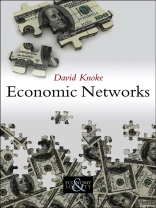Social relations are crucial for understanding diverse economic actions and a network perspective is central to that explanation. Simple exchanges involving money, labor, and commodities combine into complexly connected systems. Economic networks span many levels of analysis, from persons (consumers, employees), to groups (households, workteams), organizations (corporations, interest groups), populations (industries, markets) and the rapidly expanding global economic system.
David Knoke blends network theories from a range of disciplines and empirical studies of domestic and international economies to illuminate how economic activity is embedded in and constrained by social ties among economic actors. Social capital, in the form of connections to others holding valuable resources, is vital for finding a job, buying a car, creating a new industry, or triggering a global financial crisis. In nontechnical terms the author explicates the core network concepts, measures, and analysis methods behind these phenomena. The book also includes many striking network diagrams to provide visual insights into complex structural patterns.
This accessible book offers an invaluable critique for both undergraduate and graduate students in economic sociology and social network analysis courses who seek a better understanding of the multifaceted economic webs in which we are all entangled.
Table of Content
List of Figures ix
Preface xi
1 Economics and Social Networks 1
Mainstream and Alternative Economic Theories 3
The Economic Sociology Perspective 13
The Social Network Perspective 21
Summary and Outline of the Book 24
2 Markets and Networks 25
Labor Markets 28
Consumer Markets 41
Producer Markets 56
Summary 64
3 Networks inside Organizations 66
Micro-Network Concepts 69
Social Capital 75
Forming Employee Networks 81
Network Outcomes 90
Team Networking 105
Summary 110
4 Networks among Organizations 111
Business Startup Networks 112
Business Groups 118
Interlocking Directorates 128
Strategic Alliances 131
Evolution of Interorganizational Networks 146
Summary 155
5 Global Networks 157
International Networks 158
Supply and Commodity Chains 163
World Cities Networks 165
A Transnational Capitalist Class? 171
Networks of the Global Financial Crisis 177
Summary 186
6 Looking Forward 187
Theory Construction 188
Empirical Tools 191
Connecting Economy and Polity 193
Appendix: Network Resources 197
References 200
Index 232
About the author
David Knoke is professor of sociology at the University of Minnesota.






